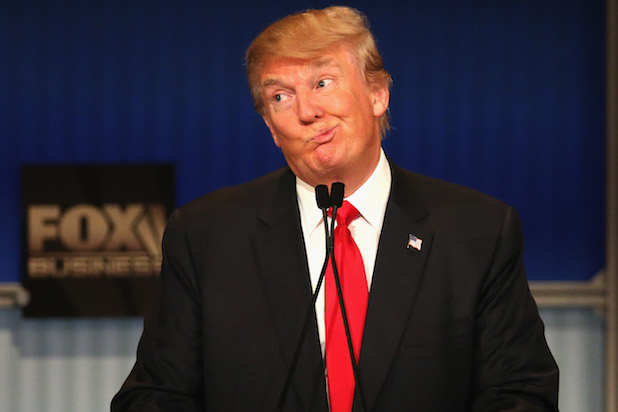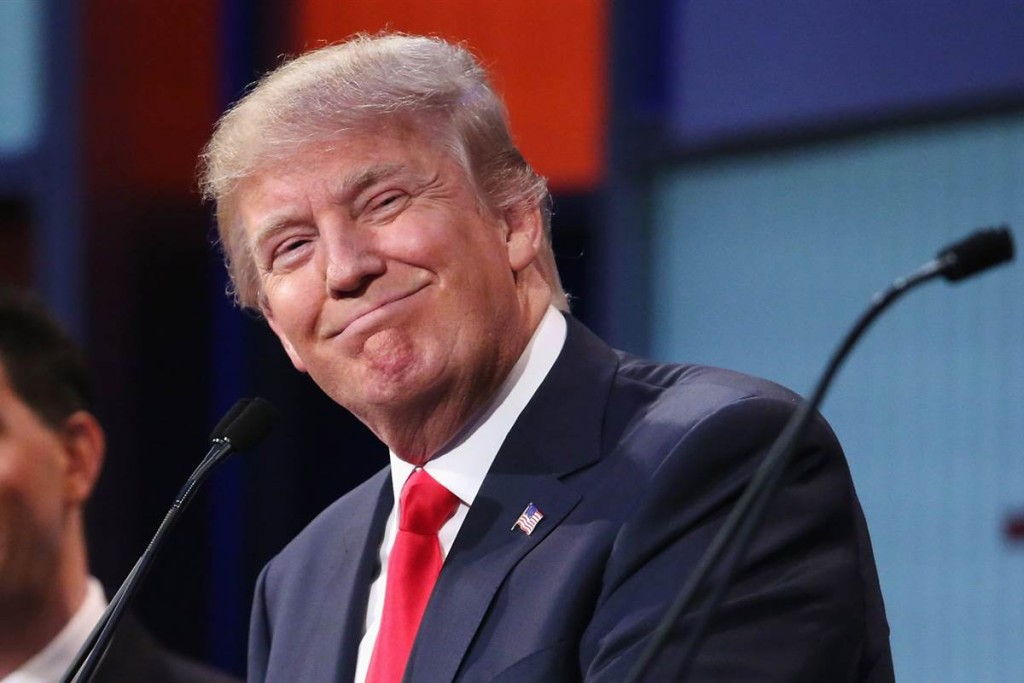Donald Trump is an expert level troll. He is in the midst of the most unconventional Presidential campaign of the Internet era. Political scientists still cannot categorize or describe him as a candidate. Meanwhile, Trump continues to hoard the media’s attention for everything he does. Most recently, Trump gained attention when visitors to JebBush.com were instead being re-directed to Trump’s own campaign website.
It seems that as early as December 8, 2015, someone purchased the domain for JebBush.com and, to the chagrin of the Bush campaign, sent visitors and Bush supporters to his rival’s official website – www.donaldjtrump.com. For the record, JebBush.com is not the official website of the Bush campaign. Additionally, Trump and his campaign team deny any direct involvement in the prank, though the current owner of the JebBush.com domain is remaining silent for now.
Just for fun, however, let us assume that Donald Trump is responsible for the domain name purchase and the re-direct to his own campaign site. Is this legal? Does this make Trump a no-good cybersquatter and trademark infringer? Let’s explore!
Is Donald Trump a cybersquatter?
The Anti-Cybersquatting Consumer Protection Act
In 1999, Congress passed the Anti-Cybersquatting Consumer Protection Act (ACPA), 15 U.S.C. § 1125(d), also known as Lanham Act § 43(d). This legislation passed after a series of “famous” names for individuals and corporate entities were being registered as second-level domain name with the standard .com or .net top level domain (TLD) by third parties who were not affiliated with the well-known person or entity. Some enterprising individuals registered hundreds of domain names only to hold them hostage for ransom when others tried to register common domain names for their entity. This practice quickly became known as “cybersquatting.” Curiously, Donald Trump himself is very familiar with this statute, having been awarded damages in 2014 against a cybersquatter who registered a series of Trump-related domains.
Under the ACPA, for “cyberpiracy prevention” a cybersquatter shall be liable under the statute as follows:
(A) A person shall be liable in a civil action by the owner of a mark, including a personal name which is protected as a mark under this section, if, without regard to the goods or services of the parties, that person—
(i) has a bad faith intent to profit from that mark, including a personal name which is protected as a mark under this section; and
(ii) registers, traffics in, or uses a domain name that—
(I) in the case of a mark that is distinctive at the time of registration of the domain name, is identical or confusingly similar to that mark;
(II) in the case of a famous mark that is famous at the time of registration of the domain name, is identical or confusingly similar to or dilutive of that mark; or
(III) is a trademark, word, or name protected by reason of section 706 of title 18 or section 220506 of title 36.
What does this mean in short-hand, plain English? Essentially, if someone owns and uses a trademark in commerce (even unregistered “common law” marks), this trademark holder can bring a claim under the ACPA against a third party who engages in the following activity:
- Has a bad faith intent to profit from the mark, and
- Registers or uses a domain name that is identical or confusingly similar to a distinctive or “famous” trademark
Of course, the definition of “bad faith” under the statute is the basis for a series of court cases and whether a mark is distinctive, dilutive or “famous” is another large body of law to analyze. First, “famous” marks are defined by the Lanham Act as a mark that “is widely recognized by the general consuming public of the United States as a designation of source of the goods or services of the mark’s owner.”[1] This mark must have been famous at the time it was registered with the USPTO. Additionally, courts applying the ACPA are guided by a series of non-exclusive factors provided by the Lanham Act that govern whether an alleged cybersquatter is acting with the bad faith intent to profit from the mark.[2] These factors include the following:
- Registrant’s trademark or other intellectual property rights in the domain name;
- Whether the domain name contains the registrant’s legal or common name;
- Registrant’s prior use of the domain name in connection with the bona fide offering of goods or services;
- Registrant’s bona fide noncommercial or fair use of the mark in a site accessible by the domain name;
- Registrant’s intent to divert customers from the mark owner’s online location that could harm the goodwill represented by the mark, for commercial gain or with the intent to tarnish or disparage the mark;
- Registrant’s offer to transfer, sell, or otherwise assign the domain name to the mark owner or a third party for financial gain, without having used the mark in a legitimate site;
- Registrant’s providing misleading false contact information when applying for registration of the domain name;
- Registrant’s registration or acquisition of multiple domain names that are identical or confusingly similar to marks of others; and
- Extent to which the mark in the domain is distinctive or famous
Accordingly, we must first determine whether JebBush.com is subject to trademark rights. Jeb Bush has previously sought to register “JEB!” with the exclamation point and everything. However, it appears that this application has since been abandoned. Of course, Jeb may still claim common law rights in the “JEB!” mark, but it is not a registered mark – which may weaken any contention that it is famous or distinctive. There are no applications on record at any point for “JEB BUSH” or “JEBBUSH” and the only registered mark for “JEB” is currently owned by Jebcom International, Inc. for skin care equipment.[3]
Nevertheless, “Jeb Bush” is relatively well-known by this point. The man is after all running for President and the Bush family is well-known for its involvement in American politics. It is practically an institution, no matter which side of the political spectrum you lean. An easy argument can be made that even if Jeb does not want to register “JEB BUSH” as a federal trademark, that his name is well-known, perhaps even famous, and that a third-party’s registration of the JebBush.com domain has the appearance of nefarious activity, including cybersquatting.
Since we are assuming (for entertainment and educational purposes only of course) that Donald Trump or someone working for him registered this domain in December, is there a prima facie case of cybersquatting in violation of the ACPA?
Cybersquatting Factors as Applied to Jeb Bush and Donald Trump
It is safe to assume that Donald Trump does not have rights in the name “Jeb Bush” including any trademark or copyright interests in that name. In fact, this name is a competitor in commerce to Trump’s current interests. The domain name also does not contain Trump’s legal or common name, nor is he affiliated with the Bush name. Trump’s campaign has never used the Jeb Bush name before, nor has Trump offered any goods or services using that name before. If anything, Trump has used the name only in a negative context to denigrate his fellow candidate. This is not a “bona fide” use in any context. Trump may claim nominative or descriptive “fair use” of the mark, but this would be undercut by the fact that JebBush.com immediately re-directs to Trump’s own website and does not describe or use the Bush name in a generic sense.
The fifth factor is the most important. “Registrant’s intent to divert customers from the mark owner’s online location that could harm the goodwill represented by the mark, for commercial gain or with the intent to tarnish or disparage the mark.” This is precisely what the current registrant is seeking to accomplish. To divert Bush supporters away from JebBush.com and towards the competitor – Donald Trump. This is the epitome of ACPA bad faith.
While there is no evidence that Trump or the registrant has offered to sell JebBush.com back to Jeb himself or to his campaign, nor is there evidence that the registrant has provided “false” details about his contact information, a finding of “bad faith” does not require that all factors be met with supporting evidence. The fact that JebBush.com immediately re-directs to the Trump campaign website alone demonstrates the bad faith intent to dilute or confuse the value of the “Jeb Bush” name and trademark. The deck is already stacked against alleged cybersquatters, and this would accordingly be a classic case of bad faith cybersquatting.
In conclusion? Donald Trump is a dirty, no-good trademark infringer and cybersquatter. If, of course, Trump actually is responsible for and/or authorized this registration and re-direct from JebBush.com to his own website. But he would never actually do that, would he? Would he??
Of course not…
[1] 15 U.S.C. § 1125(c)(2)(A).
[2] 15 U.S.C. § 1125(d)(1)(B).
[3] http://tmsearch.uspto.gov/bin/showfield?f=doc&state=4808:lmhq3i.2.12


Recent Comments